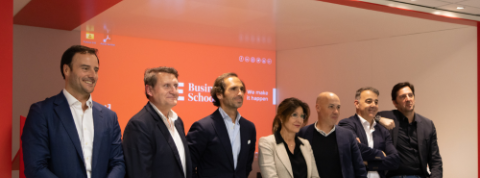
"The greatest ally of physical commerce is e-commerce”
On the occasion of addressing the evolution of Retail in 2023, EAE Business School Madrid organised a round table last Thursday, April 13 in the framework of the MBA Retail Executive moderated by Ramón Solé, Partner-Founder Retail Institute and in which topics such as the evolution of Retail in the coming years, how physical shops adapt to new consumers or how e-commerce is perfectly coexisting with physical shops were discussed.
The panel was made up of five exceptional speakers including: Laureano Turienzo, LinkedIn Top Voice Retail Spain, president of the Spanish Retail Association and director of the MBA Retail Executive; Eva Ivars, CEO Alain Afflelou Spain; Ignacio Acha, COO & Head of Transactions at Retailco (Santander Group); Jaime Pfretzschner, general manager of Phone House and Fran Torres, founder & CEO at Glocally.
First, Ramón asked a question about the current situation of the retail sector, to which Laureano clarified that "so much has happened in three years that it is impossible to know the exact changes in consumption. We are not facing a new type of consumer, but a consumer in transition". Within this context, Fran Torres affirmed that we are facing a society in constant evolution and change, "as people mainly use their savings to enjoy the moment after the pandemic".
On the other hand, Eva Ivars spoke in reference to her sector, and stated that "the consumer, in times of uncertainty, is focusing on value for money and is looking for cheap products with little loyalty".
Jaime commented that "the impact on the retail sector is the economy. When the standard of living rises, people consume less. We are seeing that after the pandemic, people are spending their money on enjoying life, travelling and indulging themselves.
He also explained that psychology and sociology have won the battle against economists and analysts in terms of consumer behaviour in this situation of uncertainty, and that the sale of products is being replaced by the sale of services, to which Laureano added that "there are studies that show that if you build loyalty through services, then the user buys products".
The panel continued with the theme of the evolution of the retail sector and how it has been changing and will continue to develop in the future. Ignacio explained that the retail sector is all-encompassing and that it is a unique model, but that it needs to adapt to the times. "It's about reinventing yourself, and those who reinvent themselves and adapt survive.
For his part, Laureano argued that the disappearance of physical shops has no scientific basis, as there is not a single city that does not have commercial establishments in its neighbourhoods.
He also stressed that human beings have always socialised in markets, which supports the continuity of physical shops. He also emphasised that e-commerce is an important ally of physical commerce, and mentioned that Walmart's online shop is the main traffic generator for its physical shops.
Fran added: "Shopping is a social act that includes the experience of going out to buy products. Consumer demands can vary, being stricter in some cases and more tolerant in others, even going as far as waiting 15 days to receive an item.
Eva then highlighted the lack of conflict between physical and online shops, highlighting the value of the user experience and the benefits that physical shops offer. She mentioned the importance of implementing automated processes and positive experiences in physical shops, such as QR shopping and virtual fitting rooms.
Ignacio said that in his sector, internal operations decisions are made with the support of digital tools, but that the help of people is essential. He stressed that customer-based artificial intelligence will be key to understanding consumers.
Laureano explained that the big leap forward for physical shops lies in knowing consumers better, as the history in this area has been poor. Fran added that replacing a person in a physical shop is complicated.
Next, the topic of sustainability was addressed, where Eva highlighted the importance of considering sustainable practices throughout the process and mentioned that sustainability has been part of her company's strategy for many years. Jaime added that the reuse and second-hand purchase of products has become profitable and is expected to continue to grow among the younger generation to drive significant changes in the future.
Laureano and Fran explained that the new generations are more concerned about sustainability, but at the same time consume products from companies that are not environmentally friendly. They stressed the need to ensure that consuming responsibly is not more costly than consuming unsustainably in the future.
To conclude the round table, Laureano highlighted the importance of training in the field of retail, highlighting EAE's sensitivity in recognising this need in society and creating the MBA Retail Executive.

